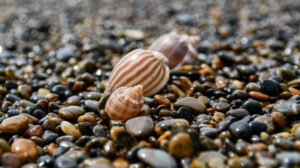Smooth white pebbles, pink and black sand, colorful shells… every beach has its own “personality,” with specific characteristics that make it stand out from others. Many beachgoers, wanting to keep a memento from the spot where they enjoyed their holidays, pack a “piece” of the beach in their luggage.
However, environmentalists sound the alarm because this practice alters the ecosystem and jeopardizes the future of beaches. Local port authorities are even recommending the prohibition of pebble collection, with fines for violators.
Regarding the risk faced by the coasts, a study was conducted by the Center for the Environment at Lancaster University, which found that elements such as sand, pebbles, and shells must remain on the beach because they serve as habitats for many species and naturally protect homes and infrastructure near the sea by preventing coastal erosion.
As scientists point out, the more pebbles and sediment there are on the beach, the more capable it is of absorbing the impact of waves. Therefore, their removal can make the coast less resilient to floods and erosion.
Of course, the volume of the beach changes throughout the year as it adapts to the seasons. Pebbles are transported by the waves, and different sizes of sediment are sorted into various parts of the beach. According to the study, stronger waves during the winter months can move larger sediments onto the beach and form pebble ridges that act as barriers and serve as the first line of natural defense against weather phenomena.
“This volume changes naturally throughout the year as the beach adapts to the normal seasonal changes in wave conditions. Waves cyclically transport and remove pebbles from the beach, creating different and distinct areas, each with different dimensions,” experts explain, according to The Conversation.
Regarding the barriers formed, they emphasize that they often constitute “the first form of natural defense against storms, as they absorb or dissipate wave energy and reduce the risk of waves eroding the coast and cliffs.”
The truth is that one less pebble won’t make a difference, but if many are removed en masse from the same beach, this can negatively impact the overall volume of the coast, disrupting its balance.
In an ever-changing climate where the risk of habitat alteration is expected to become increasingly evident, it is imperative to keep beaches as they are and allow for the natural development of coastal and ecosystem protection.
Asking people not to take pebbles from the beach, the experts continue, may seem trivial, but it is likely to help beaches play an effective role in protecting our coasts. So this summer, if in doubt, it’s better to leave that colorful, uniquely shaped pebble where it lies.
Ask me anything
Explore related questions





